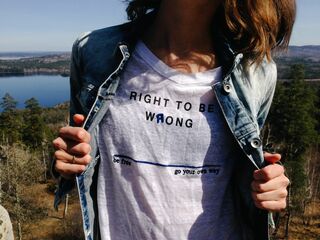Trust
Why It's Best to "Own It" When You're Wrong
If you think you're right, you probably aren't.
Posted May 11, 2021 Reviewed by Ekua Hagan
Key points
- Our cognitive biases, poor forecasting skills, and other handicaps make it likely that we're often wrong, even when we think we're right.
- Our current culture has begun to embrace being wrong as a way to improve science, business, and personal success.
- We're less likely to admit we're wrong when the opinion we're defending is close to our identity.
- Admitting when we're wrong can help sharpen our critical thinking skills.

“You’re wrong, and you couldn’t be more wrong if your name was Mr. Wrong and you were the mayor of Wrongville.”
Them’s fighting words. At least when a radio host in my town gleefully uses them to needle listeners. Nobody wants to be told they’re wrong.
But it turns out many of us are getting better at hearing that message from someone we trust: ourselves.
“I’m positive that in 100 years, much of what I take to be true today will be proved to be wrong, maybe even embarrassingly wrong,” mused Kevin Kelly recently.
We have a tendency to be wrong
If the founder of Wired magazine, one of the sharpest minds of our time, has no faith in his nose for True North, anything less than a stance of total humility seems ill-advised. Remember, DDT and asbestos and Thalidomide all seemed like fine ideas not long ago. Ditto mercury fillings and radium-painted children’s toys and suntanning with baby oil. Beloved historical figures? We’re toppling their statues; we were wrong about those folks. And there’s little to suggest our radar is getting any better. One of the major discoveries in social science of the last 20 years is just how big our cognitive blind spots are. And how poor our forecasting skills.
Screenwriter William Goldman’s claim that “nobody knows anything” has never felt truer. From election predictions to COVID protocol, experts are routinely getting stuff wrong (and sometimes being shown up by people who have no credentials at all.) We can’t know what we don’t know. And there are a lot more ways to be wrong than right. This would seem to stack the odds against our being right right now.
How we've begun to embrace "wrongness"
At the Max Planck Institute for Human Development in Berlin, the personality psychologist Julia Rohrer has launched the “loss of confidence project” on the heels of the “replication crisis” in the social sciences. She’s encouraging her peers to publicly and willingly own it when they’re wrong. The project’s an “academic safe space” for researchers “to declare for all to see that they no longer believe in the accuracy of one of their previous findings.” The best that science can do anyhow is capture “the truth for now,” as neuroscientist Daniel Levitin put it. (You could say that art actually has loftier ambitions in this respect than science — inasmuch as art tries to capture a truth that will hold up.)
The pandemic has cranked up the “all bets are off” vibe. What will disappear for good after this thing is behind us? Handshakes? Touchscreens? Cash? “I don’t know,” replied Fran Lebowitz, the off-the-cuff intellectual and cultural guru, when asked that question recently. “Here’s what I do know: Anything that anyone thinks will be happening when this is over, everyone will be wrong — including me.”
In some circles, people are trying to get out in front of their own wrongness. In Silicon Valley — that cradle of contrarianism — admitting your own ignorance is now considered the intellectual’s move. It means you’ve read your Danny Kahneman, your Dan Gilbert, your Phil Tetlock. So the venture capitalists are calling bullsh*t on themselves. “In Silicon Valley, to be truly radical, you must be wrong,” as one wag recently put it. (Honestly, there are layers to this game I don’t fully understand. But I think it has to do with the gospel of maverick investors — that what’ll save your bacon tomorrow is what everyone considers a terrible idea today. So to be wrong is to be right, just not yet.)
What’s most heartening about this Renaissance of Wrong is that unreconstructed losers are finally getting a smidge of respect. The George Costanzas of the world are the folks you can navigate by if you just turn the compass upside down.
In a classic Seinfeld episode, George, broke and alone and unhappy, realizes his life is a disaster because every decision he makes lays an egg. Jerry suggests to George that if his instincts are unerringly bad, then he should always just do the opposite of what he thinks is right. George tries this, and suddenly the doors of his life swing open. He gets the girl, gets the job, gets the delicious sandwich. Being reliably wrong turns out to be a stealth superpower: If you’re always wrong, that’s as good as being always right.
The retail sector recently made the same discovery. Researchers at Northwestern University’s Kellogg School of Management found a group — basically the George Costanzas of consumer culture — whose tastes unfailingly run to doomed products, TV shows, and political candidates. This means these “customers you do not want” are actually sprinkled not with loser dust but gold. To be that wrong is a talent so rare and valuable it can’t be cultivated: it is a kind of magic.
The path to new critical thinking skills
There’s a German word in the air these days: waltersobchekheit. It’s actually a made-up noun riffing on the movie The Big Lebowski. It means: “You’re not wrong, you’re just an assh*le.” Words hit the zeitgeist when the moment is ripe for them. Could be we’re getting weary of standoffs between people convinced of their own rightness. And the first step in reclaiming humility en masse may be to call out arrogant buffoonery where we see it.
Defund the assh*les!
Learning to lean into our own confusion, to distrust our instincts, to say “I may be wrong” as a matter of course, might actually be just the skill we need in this moment of cultural reckoning when the Western world’s privileged seem to be undergoing a mass flash education in our own unconscious biases.
Research shows we’re less likely to detect that we’re wrong when the position we’re defending is closely aligned with our identity. If we’d take it personally to be proven wrong about something, it’s hard to go there. Inside the engine room of my beliefs is what I want to be true. And that may be distorting my sense of what is true.
Now, to be clear, given that we’re more likely to be wrong, mayor-of-Wrongville wrong than we are to be right, the point here isn’t that we should all just throw up our hands and say, “It’s no use! Wrong, right, we can’t know! It’s a post-truth world!" The work now is to use our hard-won humility as a whetstone for new critical thinking skills. The goal is to get better at sussing out the difference between when we’re wrong and when we might actually be right.
More on this in Part Two.




